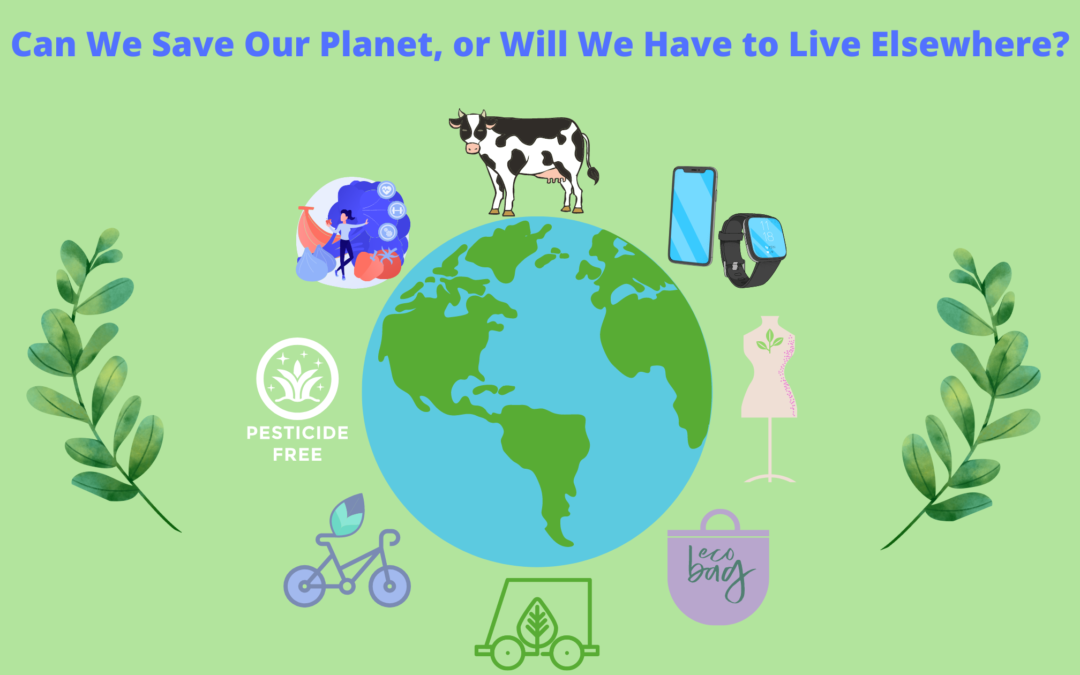Author: Alessia Carpino
Editor: Connor Fraser
Featured Image Designer: Alessia Carpino
Publisher: Alessia Carpino
While colonizing Mars sounds like an unbelievable concept from science-fiction, it may become essential to our survival. Environmental issues/climate change is a critical subject we need to tackle immediately for the sake of the preservation of humanity and the future of our planet, but can we do this quickly enough before we reach a point of no return? This leads to our critical question: “Can We Save Our Planet, or Will We Have to Live Elsewhere?”.
There are several ways to save our planet, but there are some crucial challenges we must tackle to create a more sustainable and eco-friendly world. The issues include agriculture and converting our diets/eating habits, transportation and reducing waste.
1. Agriculture and Converting our Diets/Eating Habits
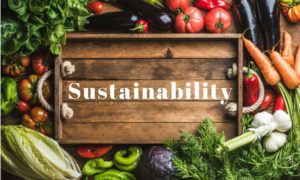 The agricultural industry is the world’s largest water-consuming sector, and the majority of the water used for agriculture is for animal feed. Eighty percent of the world’s soy and approximately one-third of our planet’s grains are reserved for the diet of animals that we later consume. Due to the growing population of humans and demand for meat, animals such as cows, pigs and chickens are being reproduced at staggering rates. If we reduce our meat consumption, we will dramatically conserve our water supply, save an abundance of grains that we can use for food and protect the lives of many animals. Additionally, food production accounts for up to thirty percent of total greenhouse gas emissions, with animal products representing roughly three-quarters of these effects. By changing our diets from beef, poultry, pork and dairy products to fruits, vegetables, beans and grains, we will dramatically decrease greenhouse gas emissions and reach climate goals. Practicing healthy eating habits like avoiding overeating, limiting distractions such as watching tv while snacking and decreasing food portions, reduces food waste and benefits human health. Also, gradually progressing to a plant-based diet minimizes agricultural land use, limits wildlife extinction, alleviates hunger, greatly improves health and saves lives.
The agricultural industry is the world’s largest water-consuming sector, and the majority of the water used for agriculture is for animal feed. Eighty percent of the world’s soy and approximately one-third of our planet’s grains are reserved for the diet of animals that we later consume. Due to the growing population of humans and demand for meat, animals such as cows, pigs and chickens are being reproduced at staggering rates. If we reduce our meat consumption, we will dramatically conserve our water supply, save an abundance of grains that we can use for food and protect the lives of many animals. Additionally, food production accounts for up to thirty percent of total greenhouse gas emissions, with animal products representing roughly three-quarters of these effects. By changing our diets from beef, poultry, pork and dairy products to fruits, vegetables, beans and grains, we will dramatically decrease greenhouse gas emissions and reach climate goals. Practicing healthy eating habits like avoiding overeating, limiting distractions such as watching tv while snacking and decreasing food portions, reduces food waste and benefits human health. Also, gradually progressing to a plant-based diet minimizes agricultural land use, limits wildlife extinction, alleviates hunger, greatly improves health and saves lives.
Pesticides are chemicals that can cause environmental pollution, primarily water pollution when used improperly. When pesticides are used on land areas to grow crops, they can travel to water bodies by wind or rainfall. As a result, the state of the water is altered by changing chemical, biological and many other conditions. These adjustments make it contaminated, toxic and inadequate for use. Additionally, pesticides that enter water bodies kill marine life and damage food chains. Pesticides can stay in the marine life’s systems, causing health issues for animals and humans. By eliminating pesticides, we are ending this major contribution to water pollution and food chain disruption, while creating sustainable ecosystems and healthier animals.
2. Transportation
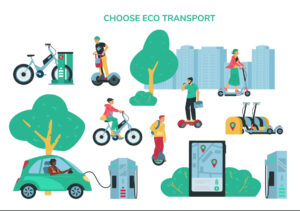
Opting to walk or bike instead of travelling in a motor vehicle is a great way to reduce greenhouse gas emissions to create an eco-friendly world! Not only that, but you can get more exercise and be a healthier version of yourself! If you must drive your own car or another motor vehicle, you can still reduce greenhouse gas emissions by staying off the road for two or more days a week. You can accomplish this by combining your errands into one trip. In addition, talk to your boss about working remotely. It’s a benefit for the company since there are fewer people in the office, your health and safety, the environment and is convenient. Another favourable mode of transportation is travelling in electric vehicles, as these vehicles don’t emit air pollutants, and in turn, prevents health problems like asthma, emphysema, lung cancer, heart disease and death. In addition, electric vehicles are economical, despite their high prices because they help people reduce fuel consumption, and fuel costs are lower. This makes them more affordable to run than gas-powered vehicles. They’re also cheaper to maintain and service since they have fewer moving parts and don’t require oil changes. No matter how you travel, make sure you stay safe and feel proud that you are making a positive difference to our environment!
3. Reducing Waste
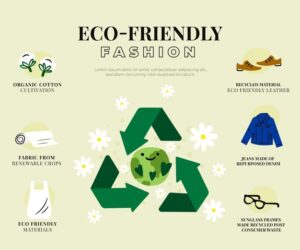
Every product we buy has an environmental footprint and can eventually turn into harmful waste, from clothes to plastic items and even electronics. The fashion industry is a major contributor to waste, a primary consumer of water, cruel to animals, increasing greenhouse gas emissions, creating unethical working conditions and is, unfortunately, unsustainable. Globally, there’s a garbage truck of textile waste burnt or dumped at a landfill every second. This is due to fast fashion companies tricking people into frequent buying habits for their profit at the cost of our planet. We must stop constantly buying clothes with cheap materials and purchase long-lasting garments from brands that contribute to sustainable fashion. By committing to this method, we are supporting sustainable fashion’s transformation of a more “green”, vegan/cruelty-free and ethical world. Plastic pollution is a terrible issue that has drastic impacts on marine life and our ocean ecosystems. Plastic usually takes hundreds of years to break down, which makes it a greater threat to our environment. By using reusable water bottles, eco-friendly bags, metal straws and other non-plastic items instead of plastic-based supplies, we will greatly reduce our plastic waste, solve plastic pollution and save animals and ecosystems. Similar to the fashion industry, large tech companies promote new products and force you to buy the latest tech by making “outdated” technology insufficient for use. Then, the e-waste isn’t thrown away properly, leading to major consequences. E-waste has negative effects on our air, soil, water and even our health, and we must stand up to tech giants that contribute to this dangerous cycle. You can learn more about e-waste by watching “The Story of Stuff”. If you watched this video, you may have noticed that it was made in 2009, but it’s sad to point out that this is still an issue we are dealing with today. Despite this, we can create great change and end e-waste for good.

What if we’re too late to save our planet? Humanity is preparing to venture out to the red planet, but there would be many things to prepare for and challenges to face. Humans would require self-sustaining water, food and oxygen to live on Mars. We must also find new methods of farming and develop sustainable ways of survival by utilizing technological advancements. Along with the technical challenges and other struggles, we must be prepared to deal with the physical and psychological impacts of this new, possible chapter of humanity.
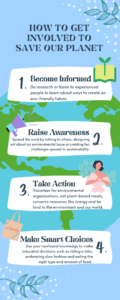 So, to come back to our key question, “Can We Save Our Planet, or Will We Have to Live Elsewhere?”. Even though humanity caused immense damage to our planet Earth, we can fix our mistakes, just like in every other situation; we just need to reverse our wrongs fast. We must save our environment, planet and humanity and not give up so we can all live a better future together.
So, to come back to our key question, “Can We Save Our Planet, or Will We Have to Live Elsewhere?”. Even though humanity caused immense damage to our planet Earth, we can fix our mistakes, just like in every other situation; we just need to reverse our wrongs fast. We must save our environment, planet and humanity and not give up so we can all live a better future together.
What we all need to do is be informed, use our voices and take action. We must take these necessary steps to protect our planet, work together and create a sustainable future for upcoming generations. Solving the large issue of climate change/environmental issues with many small, but beneficial solutions is how we’ll all live a brighter, better and healthier future!
Information Sources:
https://www.nature.org/en-us/about-us/who-we-are/our-science/three-ways-to-save-our-planet/
https://www.readersdigest.co.uk/lifestyle/technology/can-we-survive-on-mars
https://www.wwf.org.uk/thingsyoucando
https://www.permaculturenews.org/2017/05/24/pesticides-water-pollution/
https://www.hsi.org/news-media/world-water-day-2019/
https://www.pcrm.org/news/blog/5-ways-vegan-diet-helps-planet
https://thefoodmedic.co.uk/2018/10/is-dairy-bad-for-the-environment/
https://www.greenmountainenergy.com/why-renewable-energy/protect-the-environment/
https://science.howstuffworks.com/environmental/green-science/save-earth-top-ten.htm
https://blog.adecesg.com/blog/electric-vehicles-a-solution-to-air-pollution
https://www.thepersonal.com/blog/-/is-an-electric-car-right-for-you-
https://thegreenhubonline.com/2019/05/21/50-things-you-can-do-about-climate-change/
https://www.nationalgeographic.org/media/transportation-and-climate-change/
https://thevou.com/fashion/sustainable-fashion/
https://elytus.com/blog/e-waste-and-its-negative-effects-on-the-environment.html
https://www.youtube.com/watch?v=9GorqroigqM
Image Sources:
https://www.canva.com/design/DAE0Umgwus4/riK7u10IQFUFLSyoKFiXJg/view?utm_content=DAE0Umgwus4&utm_campaign=designshare&utm_medium=link&utm_source=publishsharelink – Created By: Alessia Carpino
https://farmacyvegankitchen.com/wp-content/uploads/2017/05/meat-vs-plant-based-diets.png
https://www.readersdigest.co.uk/media/images/br150608g-ap.jpg
https://www.canva.com/design/DAE0JqgaoVs/syqRCgogD0TD8E0oHWOkow/view?utm_content=DAE0JqgaoVs&utm_campaign=designshare&utm_medium=link&utm_source=publishsharelink – Created By: Alessia Carpino

